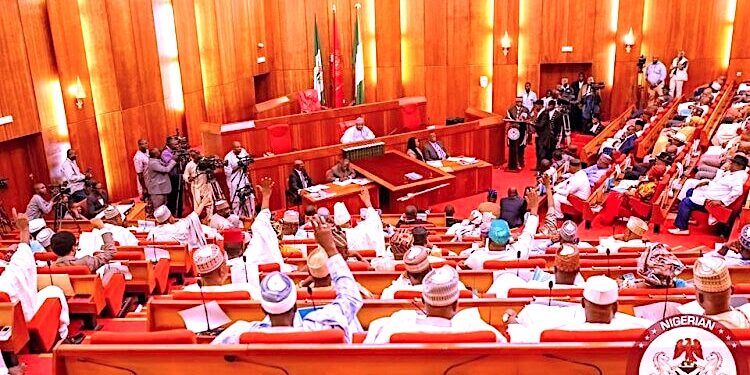The Senate has proposed transferring the burden of proof in election petitions from aggrieved candidates to the Independent National Electoral Commission (INEC), a move lawmakers say will enhance credibility and accountability in Nigeria’s electoral process.
The proposal was a major highlight of Wednesday’s plenary, where senators debated the general principles of a bill seeking to repeal the 2022 Electoral Act and enact a new Electoral Act 2025.
Lawmakers argued that the reform would strengthen democracy, improve transparency, and make INEC directly responsible for defending the integrity of the elections it conducts ahead of the 2027 general elections.
Under the current law, petitioners challenging election results must prove irregularities in line with the Evidence Act, which states that “he who asserts must prove.”
However, many senators contended that this places an unfair burden on candidates who often lack access to crucial electoral materials.
Leading the debate, Senator Seriake Dickson (Bayelsa West) said the reform was long overdue and vital for the credibility of Nigeria’s democratic system.
He maintained that INEC, as the body responsible for conducting elections, should bear the legal burden of proving that the polls were free, fair, and in accordance with the law.
“If there is one major achievement we must secure in this 10th Senate, it should be meaningful electoral reform,” Dickson said.
“INEC conducts elections, appoints ad-hoc officials, collates and declares results; it should therefore bear the primary responsibility of proving that elections were conducted in line with the law.”
Senate President Godswill Akpabio supported the proposal, insisting that the electoral body must be held accountable for the conduct of elections.
“INEC must be held responsible because it manages the logistics and the conduct of elections.
“It is in the best position to carry the burden of proof in election litigations,” Akpabio stated.
Lawmakers also raised other electoral concerns during the debate, including issues related to delegates at party primaries, defection of elected officials, and the conduct of local government elections.
Senator Abdul Ningi (Bauchi Central) called for all elected political officeholders to be recognised as delegates during party primaries, while Senator Muntari Dandutse (Katsina South) urged that any officeholder who defects from their party should automatically lose their seat to promote political discipline.
The new Electoral Act bill also proposes that INEC take over the conduct of local government elections from state electoral commissions, a suggestion that could spark disagreements between federal and state authorities.
Another provision recommends making the use of the Permanent Voter Card optional, alongside measures to strengthen technology use and real-time transmission of results.
Despite the sensitivity of these proposals, the bill scaled second reading with minimal opposition.
Its sponsor, Senator Simon Lalong (APC, Plateau), who chairs the Senate Committee on INEC, described the legislation as a comprehensive reform rather than a mere amendment.
He explained that while the 2022 Act introduced important innovations like electronic transmission of results, it also revealed significant flaws in enforcement, voter registration, and result collation processes.
Senate Leader Opeyemi Bamidele (APC, Ekiti) assured Nigerians that the legislative process on the bill would be concluded before December to ensure timely implementation ahead of the 2027 elections.
He noted that previous delays in electoral reforms had affected presidential assent and election preparations.
“Between now and December 2025, we will conclude work on the amendment of the Electoral Act 2022 so it doesn’t come too close to the 2027 elections,” Bamidele said.
He reiterated the Senate’s commitment to credible elections, democratic stability, and political accountability, adding that the chamber would not be distracted from its broader mission of rebuilding and stabilising Nigeria’s democratic institutions.
Analysts believe that if adopted, the proposed shift of the burden of proof from candidates to INEC could mark one of the most significant overhauls of Nigeria’s electoral justice system since the return to democracy in 1999.
Do you have news for us? Or feedback? Reach us at info@theplenary.com.ng, on WhatsApp: 08126247308, 08050636363

